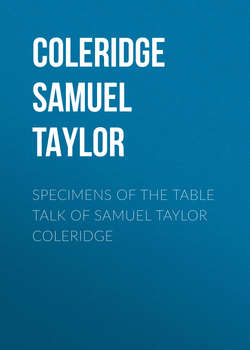Читать книгу Specimens of the Table Talk of Samuel Taylor Coleridge - Coleridge Samuel Taylor - Страница 60
TABLE TALK
May 29. 1830
ОглавлениеBOOK OF JOB
The Book of Job is an Arab poem, antecedent to the Mosaic dispensation. It represents the mind of a good man not enlightened by an actual revelation, but seeking about for one. In no other book is the desire and necessity for a Mediator so intensely expressed. The personality of God, the I AM of the Hebrews, is most vividly impressed on the book, in opposition to pantheism.
* * * * *
I now think, after many doubts, that the passage, "I know that my Redeemer liveth," &c. may fairly be taken as a burst of determination, a quasi prophecy.56 "I know not how this can be; but in spite of all my difficulties, this I do know, that I shall be recompensed."
* * * * *
It should be observed, that all the imagery in the speeches of the men is taken from the East, and is no more than a mere representation of the forms of material nature. But when God speaks, the tone is exalted; and almost all the images are taken from Egypt, the crocodile, the war-horse, and so forth. Egypt was then the first monarchy that had a splendid court.
* * * * *
Satan, in the prologue, does not mean the devil, our Diabolus. There is no calumny in his words. He is rather the circuitor, the accusing spirit, a dramatic attorney-general. But after the prologue, which was necessary to bring the imagination into a proper state for the dialogue, we hear no more of this Satan.
* * * * *
Warburton's notion, that the Book of Job was of so late a date as Ezra, is wholly groundless. His only reason is this appearance of Satan.
56
Chap. xix. 25, 26.
